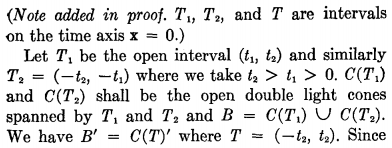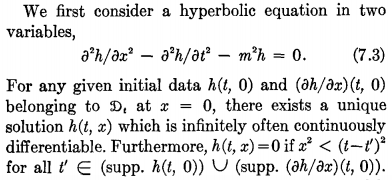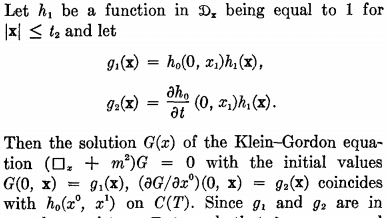In his paper "Von Neumann Algebras of Local Observables for Free Scalar Field" Araki used the solutions of the equation
$$\frac{\partial ^{2}h}{\partial x^2}-\frac{\partial ^{2}h}{\partial t^2}-m^2h=0$$
where he put the suport of the initial data $h(t, 0)$ and $\frac{\partial h}{\partial x}(t, 0)$ at $x=0$.
Then He used this solution (noted as $h_{0}$) to pose another Klein-Gordon Problem in $\mathbb{R}^{4}$: $$(\Box+m^2)G=0 $$ with initial conditions
$G(0,\vec{x})=h_{0}(0,x_{1})h_{1}(\vec{x})$ and $\frac{\partial G}{\partial x^0}(0,\vec{x})=\frac{\partial h_{0}}{\partial t}(0,x_{1})h_{1}(\vec{x})$
where $h_{1}$ is a function wich is equal to 1 in a ball (of radius $t_{2}$) which contains the suports of the initial conditions for $h_{0}$ and then goes to zero smoothly.
Araki asserts that $G(x^0,x^1,0,0)=h_{0}(x^0,x^1)$ for $|x^0|+|x^1|<t_{2}$, where $t_2$ satisfies $h_{1}(\vec{x})=1$ for $\|\vec{x} \|<t_{2}$.
My question is why the extra dimensions doesn't affect the equality, at least for near points. I know the initial contitions for $G$ has translation simmetry in $x^3$ and $x^4$ and I think this would be important.
Some parts of Araki's paper
And the problematic part for my
Many thanks in advance.



